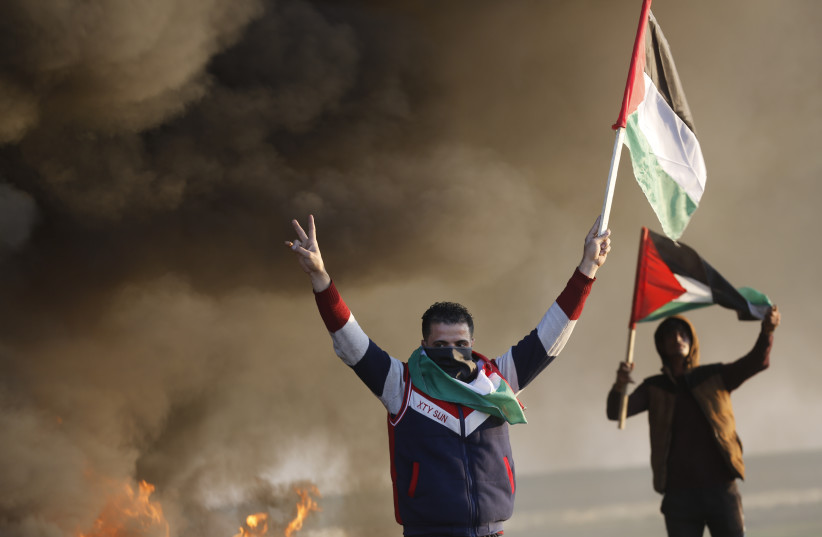A 100-meter-long tunnel; six rocket launch attempts in three months; Palestinian Islamic Jihad (PIJ) leaders publicly thanking Iran for financial and armament support. This isn’t Gaza. It’s Jenin.
The upshot of the 2005 Disengagement from Gaza has become one of the most common arguments against a future Israeli withdrawal from the West Bank; we left Gaza and got rockets.
Israel’s Gaza envelope residents live in a state of cyclical trauma, where the next round of missiles that sends civilians racing to shelters is inevitable.
As a result many Israelis see evacuation of West Bank settlements – not to mention military withdrawal – as a drastic blow to Israeli security.
In response to this logic, the Israeli government is implementing the opposite of disengagement in the West Bank today. Current policies include expanding construction plans at a record pace, ignoring new illegal outposts, legalizing old illegal outposts, granting a civilian minister unprecedented power over the Civil Administration, regularly entering Palestinian population centers, and generally demonstrating full IDF and settler control of the area in every way that matters.

In accordance with those who see the disengagement from Gaza as a security catastrophe, these steps should increase the safety of all of Israel’s citizens, from Ma’aleh Adumim to Tel Aviv. However, as the Israeli government escalates settlement expansion and IDF activity in Palestinian cities, the territories east of the Green Line are instead becoming strongholds for Palestinian terror that threatens to surpass anything Gaza can produce.
The Palestinian Authority is losing legitimacy and control over security coordination in some of the major population centers. Hamas trounces Fatah in West Bank university student elections. A new armed group whose only unifying political platform is rejection of the Palestinian establishment and overwhelming desperation springs up in Nablus, lionized by the locals.
These trends are used by the Right as proof of the security need for continued, and even strengthened, Israeli presence. If we withdraw, the argument goes, Hamas will win over the entirety of the West Bank and anti-Israel chaos will ensue.
It’s happening anyway.
The West Bank is already collapsing into chaos even without the Palestinian Authority's collapse
Palestinian security coordination with Israel will crumble when the PA collapses, and currently it is on life support. As the only political actor in the field still promising national self-determination through peaceful negotiations, its legitimacy takes a hit with each settlement housing unit built.
After President Mahmoud Abbas leaves the political arena, the main security difference between Gaza and the West Bank will be the multicultural nature of the acts of terror committed in the latter.
Settlers often claim that they know and understand their neighbors in ways that the average Leftist Israeli never will. Perhaps, but while well-intentioned suburbanites in Efrat invite Palestinian construction workers into their kitchens for a 20-minute coffee break, masked teenagers from Yitzhar are caught on video slinging stones at unarmed shepherds.
The claim that settler violence is a peripheral phenomenon no longer convinces anyone but the settlers themselves.
The settler revenge-attacks on Huwara and Turmus Ayya are simply too horrific for the rest of Israeli society to ignore any longer. And yet, while the scale-up of Jewish radicalization in the West Bank is finally drawing the attention of the Israeli mainstream, it’s still not enough for the extremists’ purposes.
The level of oppression required to make Palestinians give up all national aspirations would be unimaginable. Without any hope of a future solution, the situation can only deteriorate. After decades of relying on deterrence through violence, escalation is now the new status quo.
The Gazafication of the West Bank is not a theoretical threat to be used against any hint of settlement evacuation. It is the reality unfolding on the ground today. And yet, just like the rise of Hamas in the Gaza Strip, it is both predictable and preventable.
The latter, however, would require partnership with pragmatic Palestinian leadership and the political courage to not just freeze, but to reverse the territorial expansion of the settlement movement.
There have been three serious bilateral negotiation attempts to achieve a political solution to the Israeli-Palestinian conflict since the creation of Israel: Oslo, Camp David, and Annapolis. Meanwhile, there have been 15 military operations in Gaza since 2005, close to 4,000 Palestinians killed in the last 10 years, and around 150 illegal outposts established since Oslo (not including government-sanctioned settlements, now numbered at well over 100).
If we diverted a fraction of the energy expended on conflict management into serious efforts to achieve a peace agreement, perhaps our success would be as spectacular as the complete and utter failure of trying to make millions of Palestinians give up on self-determination through sheer force.
The writer is the deputy director of the Geneva Initiative.
